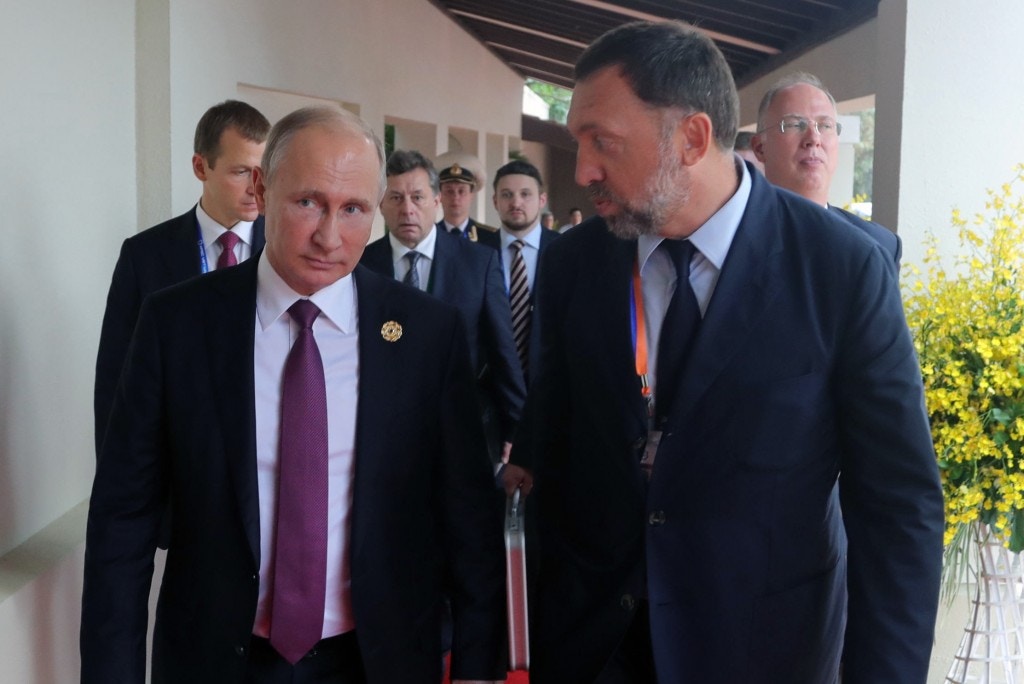
The Russian spies, agents of influence, and simply the useful idiots
Trump News – The Counterintelligence Investigations of Donald Trump – trump-news.org
“That truncated FBI investigation that needs to be resumed immediately.” (!!! – M.N.)
Only by neutralizing McCabe, removing him, and discrediting him could Trump evade the greatest risk he faced — a counterintelligence investigation into his Russian dealings.
That truncated FBI investigation that needs to be resumed immediately.
New revelations about Mueller’s investigation raise serious questions about how and why Rosenstein…
Donald Trump was never investigated to determine if he is a Russian agent or asset, according to an explosive book published today by a Pulitzer Prize-winning investigative reporter. In Trump v. The…
rawstory.com
“Donald Trump was never investigated to determine if he is a Russian agent or asset, according to an explosive book published today by a Pulitzer Prize-winning investigative reporter.”
Counterintelligence Investigations of Donald Trump on GS | On RSS Dog
Blogs
No items found... _______________________________________
Selected Articles
Trump met the Russian woman through his business connections at a party at a luxury hotel in Moscow, and the two apparently had a brief affair, at a time when Trump was married to his second wife, Marla Maples. The Senate report has redacted the woman’s name and blacked out her face in photos taken of her with Trump at the time and provided to the committee. But the report explains in detail how Russian intelligence operatives keep track of the sexual activities of visiting foreign business executives, and notes that the Moscow-based U.S. businessman who introduced Trump to the woman probably told Russian government officials about it.
The report reveals the true nature of the counterintelligence threat posed by a president willing and eager to accept the help of a foreign adversary to win American elections.
In fact, the Senate report dismisses many of the most outrageous accusations involving Trump and Russia even as it provides overwhelming and damning evidence of Russia’s efforts to intervene in the 2016 presidential election to help Trump win and the Trump campaign’s eagerness to embrace the Russian intervention.
But the Senate report goes much further than election interference and provides the first detailed examination of the broader and complex network of relationships between Trump, his ever-shifting circle of personal and business associates, and a series of Russian oligarchs and other Russian and Ukrainian figures with ties to Russian President Vladimir Putin. In the process, the report provides badly needed context for the events of 2016 and beyond. Above all, it reveals the true nature of the counterintelligence threat posed by a president willing and eager to accept the help of a foreign adversary to win American elections.
But the Senate report is particularly significant now, as the 2020 general election campaign intensifies and Trump and his supporters continue to deny that Russia tried to help him win in 2016 and that Moscow is trying to do so again this year. In recent days, John Ratcliffe, the director of national intelligence, has said that the DNI will stop in-person briefings for Congress about election interference, angering congressional Democratic leaders who charge that Ratcliffe and the Trump administration are trying to keep the public in the dark.
But the Senate report cuts through the political noise with clear and unequivocal language to explain what happened in 2016.
At nearly 1,000 pages, the Senate report is by far the best and most thorough examination of the Trump-Russia story to date, and puts the narrower and more legalistic Mueller Report to shame. Robert Mueller, the former FBI director appointed in 2017 to be special counsel to investigate the Trump-Russia case, kept his focus on gathering evidence for specific criminal prosecutions; the Senate report shows that he missed the forest for the trees.
“Over the course of its investigation, the [special counsel] successfully secured numerous criminal indictments and convictions,” the Senate report states. “While criminal prosecutions are a vital tool in upholding our nation’s laws, protecting our democratic system from foreign interference is a broader national security mission that must be appropriately balanced with the pursuit of criminal prosecutions. It is the committee’s view that this balance was not achieved. Russian interference with the U.S. electoral process was inherently a counterintelligence matter and one not well-suited to criminal prosecutions.”
The Senate report is most remarkable for its bipartisan nature. It was produced by a Republican-controlled committee, but the report almost never seems to pull its punches aimed at any of its targets. It is unsparing in its description of Trump and his campaign aides as eager to reach out for Russian help in 2016, but is equally tough in its criticism of the FBI for its missteps in its subsequent investigation of Trump and Russia’s intervention in the election. Along the way, each episode is recounted in exhaustive detail, and the result is that the reader is left with a clear understanding of the relative significance of the different chapters of the Trump-Russia case. That is a relief after years of partisanship and polarization have skewed the public’s understanding of the case.
Lust, Avarice, Opportunism, Incompetence
In fact, the Senate Intelligence Committee’s report is a throwback to an earlier era of congressional investigations in which bipartisanship was the rule, not the exception. The report is so thick with research and evidence that the letters from Republican and Democratic senators on the committee, attached at the end of the report and arguing over the report’s meaning, seem trivial by contrast.
Perhaps the only significance of the attached letter from the Republican senators is the name of one senator who didn’t sign it: Richard Burr of North Carolina, who until recently was the committee’s chair. Burr was forced to step aside in May, after the disclosure that he was under investigation for stock sales he made before the American public knew the extent of the likely economic threat posed by the Covid-19 pandemic. But by that time, the committee’s work on the Trump-Russia case was virtually complete. In hindsight, Burr appears to have played a key role in protecting the committee’s investigation from excessive partisan influence.
The independence of the committee’s investigation is evident in its clear and concise conclusions.
“The committee found that Russian President Vladimir Putin ordered the Russian effort to hack computer networks and accounts affiliated with the Democratic Party and leak information damaging to Hillary Clinton and her campaign for president,” the report states. “Moscow’s intent was to harm the Clinton campaign, tarnish an expected Clinton presidential administration, help the Trump campaign after Trump became the presumptive Republican nominee, and undermine the U.S. democratic process.”
“The committee found that Russian President Vladimir Putin ordered the Russian effort to hack computer networks and accounts affiliated with the Democratic Party and leak information damaging to Hillary Clinton and her campaign for president.”
The report states that “while the GRU and WikiLeaks were releasing hacked documents, the Trump campaign sought to maximize the impact of those materials to aid Trump’s electoral prospects. To do so, the Trump Campaign took actions to obtain advance notice about WikiLeaks releases of Clinton emails; took steps to obtain inside information about the content of releases once WikiLeaks began to publish stolen information; created messaging strategies to promote and share the materials in anticipation of and following their release; and encouraged further theft of information and continued leaks.”
One of the most intriguing sections in the report deals with the relationship between Paul Manafort, the onetime Trump campaign chair, and a Russian intelligence officer. Indeed, the Manafort section of the report is a prime example of how the Senate investigators brought fresh eyes to a well-known episode in the Trump-Russia case and, unlike Mueller, found new information by examining it as a counterintelligence matter.
In March 2016, longtime international lobbyist Paul Manafort joined the Trump campaign and by May was named the campaign’s chair. Manafort offered to work for Trump for free.
 Russia’s President Vladimir Putin (L) talks to Rusal President and Management Board Member Oleg Deripaska at the 2017 Asia-Pacific Economic Cooperation (APEC) summit at Da Nang, Vietnam on Nov. 10, 2017.
Russia’s President Vladimir Putin (L) talks to Rusal President and Management Board Member Oleg Deripaska at the 2017 Asia-Pacific Economic Cooperation (APEC) summit at Da Nang, Vietnam on Nov. 10, 2017.Photo: Mikhail Klimentyev/TASS via Getty Images
By 2016, Manafort was caught up in a fight with Deripaska over an investment that had gone sour, and he saw his new position with the Trump campaign as a lifeline to help him resolve the situation. “Once on the campaign, Manafort quickly sought to leverage his position to resolve his multi-million dollar foreign disputes and obtain new work in Ukraine and elsewhere,” the Senate report concluded.
While he was working for Trump during the 2016 campaign, Manafort stayed in contact with Kilimnik and gave him the Trump campaign’s internal polling data, which showed that the key to defeating Clinton was to drive up negative attitudes about her among voters.
The Mueller report found that Manafort had shared Trump polling data with Kilimnik, but didn’t examine why he had done so. The Senate report says that the intelligence committee “obtained some information suggesting Kilimnik may have been connected to the GRU’s hack and leak operation targeting the 2016 election.” The report adds that “this information suggests that a channel for coordination on the GRU hack operation may have existed through Kilimnik.” The report adds that in interviews with Mueller’s prosecution team, “Manafort lied consistently about one issue in particular: his interactions with Kilimnik.” Manafort decided to “face more severe criminal penalties rather than provide complete answers about his interactions with Kilimnik.” The Manafort-Kilimnik relationship, the Senate report concludes, represents “the single most direct tie between senior Trump campaign officials and the Russian intelligence services.”
The Senate report is filled with such rich details, shedding new light on the wide cast of characters surrounding both Trump and Putin, and the end result is an engrossing tale of modern intelligence — and of lust, avarice, squalid opportunism, and incompetence — worthy of John le Carré. With its depth of research, layered with an understanding of a complex series of personal networks in both the United States and Russia, the Senate report has done what none of the previous investigations have achieved. It has brought the Trump-Russia story to life.
_____________________________________

